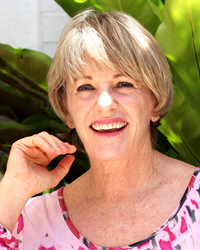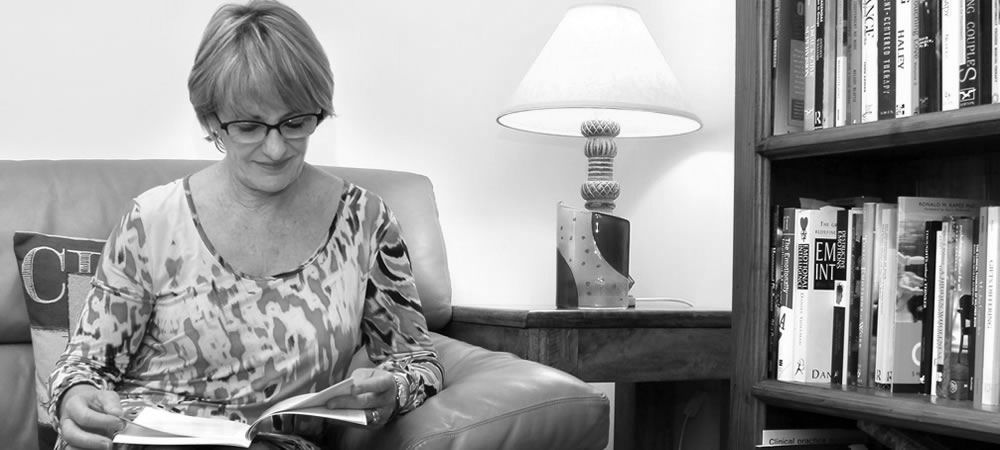Ms Karen Anderson
Family Therapist, Psychodynamic Psychotherapist
Attadale, Perth WA 6156
View Profile

Philosophy & Vision
Karen is a psychodynamic psychotherapist, counsellor, couple and family therapist, and group therapist who has extensive experience working within educational, welfare and health sectors.
Karen works psychodynamically and embraces a holistic approach towards assisting people to achieve psychological and emotional health and well being.
Background
Karen is a permanent staff member in the Counselling and Psychotherapy team in the School of Arts and Humanities at Edith Cowan University, teaching in undergraduate and postgraduate courses in Perth (2001 - current) and previously off-shore in Singapore (2001 - 2010).
Karen commenced her private practice in Subiaco, Western Australia in 1992 and has maintained this practice now for 28 years.
Karen has worked in the provision of psychosocial care in oncology, palliative care and disability for 20+ years.
Services
Karen has a particular interest and extensive experience in working with people who have a life threatening illness or disability. Karen also specialises in bereavement, grief and loss as well as in relationship and couple therapy.
During Covid-19 period 2020, the following services are available:
* In-person sessions respecting Federal Government physical distancing guidelines
*Telehealth including Skype, Zoom and Telephone counselling
Karen is an Accredited Clinical Member (Reg. No. 20042) of PACFA.
Quality Provision
Karen served on the Management Committee of the Psychotherapists and Counsellors Association of Western Australia (PACAWA) for many years as well as serving on the Training Standards Sub-Committee of the Psychotherapy and Counselling Federation of Australia (PACFA) for several years. She has served as a Board Member on several community based agencies.
Karen is a Member of Palliative Care WA and of the Australasian Palliative Care Link (APLI).
Areas of Special Interest
Accreditations
- Masters in Social Sciences (Counselling) - 1998 - Edith Cowan University
- Grad Dip Arts (Counselling) - 1990 - Edith Cowan University
- Certificate in Action Groupwork - 1996 - The Wasley Institute
- Bachelor of Education - 1984 - Western Australian College of Advanced Education
- Diploma in Business Management - 2005 - Modal Pty Ltd
Modalities
Developmental - Existential - Experiential - Mindfulness - Person Centred - Psychodrama - Psychodynamic - Systems Theory
Therapy Approach
'Being Centred' developed from the belief that for a person to resolve issues, make decisions and find inner contentment within themselves, they need to first begin to feel connected with their own being and personhood - to feel a sense of being centred within themselves and who they are. To have a sense of being in relationship with oneself and the world around oneself enables a person to move readily with the ebb and flow of life.
Professional Associations
- Psychotherapy and Counselling Federation of Australia - Clinical
Practice Locations
63A Stock Road
Attadale WA 6156
Being Centred is located in close walking distance to train and bus services and easy access to the Mitchell Freeway.
Appointments
Available for client consultations on
Fridays 8.00am to 4.00pm.
Other times on weekdays are available
upon discussion with Karen.
Fees & Insurance
$140 Standard Individual Consultation
$180 Couple & Family Therapy
$150 Clinical & Professional Supervision
Discounted fees are available. Selected services are via subsidy.
Payment Options
Payment is required at time of consultation.
Cheque, cash and internet bank transfer
is accepted.
Contact Karen
Please contact me to make an appointment

A conversation with Karen Anderson
-
I grew up in a family as one of four children and my younger sister was severely intellectually disabled. I know this to have been a powerful influence upon me at many levels. I was very attuned to the emotional nuances in many of the people around me. Later as a teacher working with the first Vietnamese and Kampuchean refugees here in Western Australia I knew I had the compassion to be with and support them however I realised fairly quickly that I needed to learn more about the experience of psychological trauma in order to be of further and greater assistance. I had also been one of the initial teachers establishing the school on Home Island on the Cocos (Keeling) Islands.
The love I felt for and received from the Cocos-Malay people influenced me in wanting to train more specifically in counselling and psychotherapy so as to be able to better support people from different cultures as they made cultural transitions. In short, I understood early in my life that I was capable of feeling deep compassion however, that alone was not sufficient to work well with people. I knew I needed to learn something about psychological theory and knowledge as well. I needed to bring together the heart and feelings with sound theoretical knowledge so as to apply both for the benefit of others. -
My original training in developmental and educational psychology gave me an appreciation for the important process of attachment and when ruptures to attachment occur the subsequent impact of loss and hence the experience of grief. At the time in the 1970s and 1980s I was greatly interested in the writings of such people as Gregory Bateson, Salvador Minuchin, Jay Haley, Virginia Satir, Margaret Mead and Ram Dass.
After the diagnosis of schizophrenia and the subsequent suicide of my first husband in our mid twenties, my father introduced me to the writings of Victor Frankl and so began my interest and direction in existential psychotherapy. Since then I have continued to deepen my understanding and knowledge with regards to existential concerns and issues. Along the way I have been strongly influenced by systems theory, systemic thinking, psychoanalytic and psychodynamic theory. Throughout all of this time at a more personal level I explored Buddhism and Taoism and their valued application to living an enriched, meaningful and purposeful life - both personally and professionally. -
Within my own family-of-origin experiences I learned about the human capacity of vulnerability and its implications for living a life wisely and usefully as opposed to succumbing to relentless destructive thinking. I remain in awe of the human spirit's potential to endure and rise beyond difficult cognitive, emotional and physical as well as spiritual duress. My personal experience has led me to now view 'adversity as a seed for growth'. My life experiences have also taught me enormously to deeply respect and value emotional intelligence as independent from intellectual intelligence.
-
Regardless of whichever theoretical method or approach I might select to apply or use in my work with a client, I endeavour always to function from a position of 'being centred' within my own self. It is important to how I work that I am able to 'be' first and foremost with another rather than 'do' something to or with the person. Hence, my clinical practice of 20+ years has been called, 'Being Centred'. My capacity to 'be with' others in the therapeutic setting effectively has grown and developed over the years.
In an operational sense I do think developmentally, systemically and psycho-dynamically when working with clients to explore their presenting concerns and issues. I believe the experiences within my own family-of-origin particularly with regards to my sister's intellectual disability and the various associated dynamics arising within the family system, influenced me greatly in naturally developing a heightened availability to readily attune to unconscious emotionality within those around me. This has been a useful skill as a therapist. Similarly, I have always resonated with existential thought processes and so it's not surprising I've ended up specialising in working in the field of psycho-oncology and palliative care.
I regard reflection as an essential technique/method for me to work therapeutically. I have continuously incorporated frequent professional reflective practice in the form of regular clinical supervision - both individual and group supervision. I also actively personally reflect on a routinely daily basis with various meditation practices. -
Tough question!! This will vary with each and every client and is determined by such variables as contextual influences, social-cultural influences, historical and personality factors and a host of other influences. I find this an extraordinary difficult question to respond to and am not sure at all that there is any clear answer possible.
-
My own personal therapy has stretched me enormously. In the 1970s and 1980s in particular, like so many others I undertook a broad selection of various individual and group therapies as part of the encounter movement. Some of these were personally 'brutalising' and even 'bruising' but in later years I am grateful for having lived through this period and having been exposed to some of these techniques for the simple reason they challenged me in ways I would never have willingly chosen. Having submitted myself to personal therapy over the past 40 years whilst training, developing and maturing as a counsellor and psychotherapist myself, I now feel humble and privileged to have had the opportunity to expose myself to such explorations.
I view my therapy as having been an 'investment in life' rather than an 'expense'. All of it, the good and the bad, the useful and the decidedly not useful, has without a doubt improved me as a human being, has expanded my mind and thinking and has added depth to my soul.
Working as a counsellor, psychotherapist and couple and family therapist has enriched who I am substantially. I do believe I have learned and gained from and been taught by my clients in significant ways about the humility of what it means to simply be human. Of course I am a better person for having experienced sharing together with so many others, their and my own internal worlds. It's a priceless gift. -
In short, I deeply value the aspect of sharing and exploring with another fellow human being the realm of their internal psychic world, our internal worlds as we explore and reflect together. To experience the relational dimension with another in a discrete and defined therapeutic space and time and then to reflect upon the multiple layers encountered within that experience is highly satisfying and enriching.
To "be with' whilst demanding high levels of concentration and focus, is enormously gratifying. It's not common to experience the same in my regular, "outside-of-the-therapeutic setting', social world of reality. I find it wonderful to be able to work with meaning at the deeper level which occurs within the therapy room. This is also true with both individual and group clinical supervision.
There is something about being in the presence of suffering which is levelling for me. It grounds me and reminds me of the fragility and vulnerability of what it means to be human which is again gratifying. -
Absolutely!! There are days when I am out of sync with my own self and this does impact upon my work in the therapy room and with associated administrative functions. I do notice times when I breathe a sigh of relief when a client phones in to cancel or rearrange an appointment. These are days when I do attempt to counteract the sense of being "off centre' by increasing self care strategies including such things as taking time to go outside of my consulting room during breaks and briefly walking about in the fresh air and connecting with nature.
-
Overpopulation. Raping of the earth's below and above ground natural resources without longer term care plans. Not heeding the planet's groans of suffering - weather implications, environmental destruction. She's actively crying out and giving us warnings but we still don't appear to be listening!
-
The things which have inspired me and continue to do so are many and varied:
• Victor Frankl's book, “Man's Search for Meaning†given to me by my father
• My father's letters to me and the wisdom of his writings
• The films, “Brother Sun, Sister Moon†(early1970s), “Easy Riderâ€, “WoodStock†(late1960s) and "As it is in Heaven" (2003)
• Watching Margot Fonteyn and Rudolf Nureyev dance Swan Lake and Giselle
• Leonard Cohen singing "Bird on a Wire†and “Hallelujahâ€

